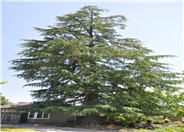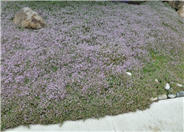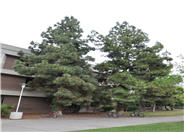
Common name:Toyon, Christmas Berry
Botanical name:Heteromeles arbutifolia
Toyon is a California native evergreen shrub that grows 8'-15'. high and spreading 2'-3'. It has leathery, toothed leaves, white summer flowers and clusters of red winter berries. It tolerates full sun or partial shade, heat, smog, wind and heavy or light soils. It is drought tolerant, attracts beneficial insects and hummingbirds. - Cornflower Farms

Common name:Deodar Cedar
Botanical name:Cedrus deodara
This fast-growing, coniferous evergreen is capable of reaching a size of 80' high by 40' wide. Its needles are a light, silvery green color, 2" long. Flowers are inconspicuous. Barrel shaped cones appear in fall and winter. Branches are pendulous and spreadings. Plant in area that has ample room for growth.

Common name:Flanders Poppy
Botanical name:Papaver rhoeas
This beautiful annual has bright red single flowers, each petal often marked at its base with a large black blotch. Sow seeds in spring. Flanders Poppy is attractive near entries, walkways, and in containers. It can reach 3' tall and prefers full sun in well draining, rich soil. It may re-sow.

Common name:Victor Reiter Thyme
Botanical name:Thymus 'Victor Reiter'
This evergreen groundcover needs full sun to light shade. It grows to 3" tall, forming a dense, thick mat. It needs well-drained, light soil. Creeping Thyme is considered drought tolerant. The foliage is dark green and slightly hairy. It has a pleasant, minty fragrance when crushed, though not considered for culinary uses. Flowers are lilac purple and bloom in the summer. It attracts bees and butterflies.

Common name:Canary Island Pine
Botanical name:Pinus canariensis
This graceful, slender-growing pine has a pyramidal form to about 70'. Its needles are long and drooping in bundles of 3. The foliage is a blue-green color, maturing to a dark green shade. Needles can grow to 12" long. Flowers are insignificant. Cones appear in the spring.
Designer: Jody Palmer
Photographer: GardenSoft
Practice grass-cycling by leaving short grass clippings on lawns after mowing, so that nutrients and organic matter are returned to the soil.
Mulching and adding compost to soil can minimize evaporation and help soil absorb and store water.
Drip and other smart irrigation delivers water directly to roots, allowing no excess water for weeds.